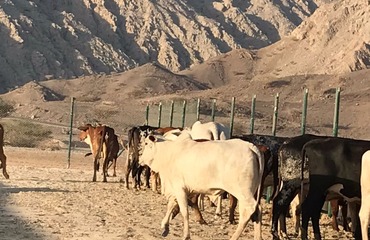São Paulo – The United Arab Emirates are importing a herd of 210 head of cattle from Brazil and, for the first time, many breeds developed in Brazilian soil are being shipped to the country, including Nelore, plus 20 semen samples of 17 different breeds. The company responsible for the deal, the São Paulo state-based Agro Betel, also coordinates the setting up of a bovine genetics lab in the emirate of Fujairah.
The lab is expected to begin operations in January and this is the first time that Brazil exports this type of technology to the Arab country. The UAE holds this type of technology only regarding camels.
Brazilian staff is already working with the first batch of animals, exported on November 4 through Emirates SkyCargo, the cargo division of Emirates Airline, which included 91 head of cattle.
The staff will be in the country for around two months monitoring feeding and treatment during the animal’s adaptation period, and also training the local workforce. The animals will go to a farm in the Fujairah emirate, which provides a roofed but open shelter, with ambient temperature.
The company is exporting 12 breeds of beef cattle, among them black Brangus, Canchim, Brahman, Red Angus, Wagyu and Nelore, plus 5 dairy breeds, such as Gyr, Girolando and Caracu. Until now, only Gyr had been exported to the UAE, on December 2016.
Fujairah will receive 170 adult female animals, pregnant or that have already calved, four adult males and 36 calves. According to Agro Betel, the project of the importer (which asked not to be identified) is one of genetic experimentation, that is, the importer plans to assess which breeds better adapt to the country’s climate as to invest in local breeding to produce beef and dairies in the long term.
According to the company, the importer bought 17 breeds present in Brazil throughout many states, including European breeds from the country’s Southern part. “We advised them not to buy these because of the climate, but he wanted to try the widest possible range of breeds,” said the veterinarian in charge, Daniele Araújo da Costa.
The importer favored pregnant cows or those that calved recently so the calves will have better chances of survival in the desert climate. “Since the country’s temperatures are very high, the chances for adaptation of the cattle born over there are higher,” explains Costa.
The veterinarian said that each buyer has a different profile. In this case, the client prioritized a wide range of high-quality breed in small numbers, to facilitate the genetic experiment. It involved 20 breeders of the best cattle of each breed, including farm Nelore do Golias, located in Araçatuba, 524 km from São Paulo, which exported 16 heifers.
The owner of the farm specialized in the Nelore breed, Fábio de Almeida Filho, said this is the first time the breed’s exported to the UAE. “The Sheik bought the best animals from many different breeds to have breeding cows and donors, and the heifers that we exported will go through in vitro fertilization,” said Almeida.
Agro Betel exports other live animals, such as peacocks, pigeons, sheep and chicken to the UAE since 2015. In addition to its headquarters in Ibitinga, 351 km from São Paulo, the company owns farms in Uruguay and the United States.
For information, visit www.agrobetel.com.br
*Translated by Sérgio Kakitani




